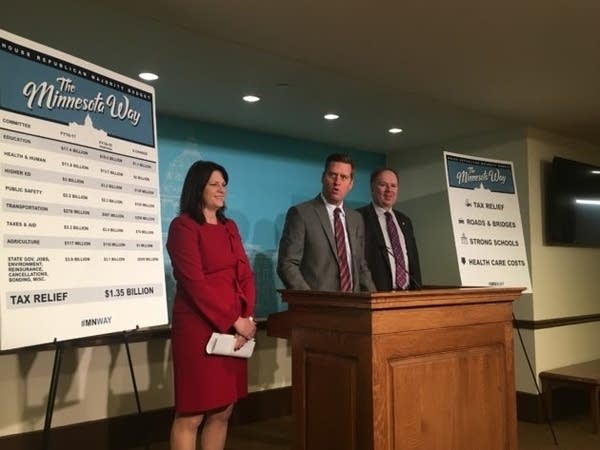Tax relief questions stand in the way of Minnesota budget deal

Go Deeper.
Create an account or log in to save stories.
Like this?
Thanks for liking this story! We have added it to a list of your favorite stories.
With two weeks left in the 2017 legislative session, DFL Gov. Mark Dayton and Republican leaders disagree on a host of issues. But how much to give back to Minnesotans in tax cuts remains the biggest hurdle.
The $1.15 billion tax bill that Republicans want is too big for Dayton. Even though the state has a budget surplus that now stands at $1.5 billion, his tax bill proposal is just $300 million.
"The governor knows that we are expecting to pass a good tax bill with tax relief for all Minnesotans, especially middle-class Minnesotans," said House Majority Leader Joyce Peppin, R-Rogers.
Dayton wants more money to spend on early childhood education, colleges and other budget areas. "That's my priority," he said. "Theirs is tax cut, tax cut and raiding the general fund for the transportation bill. So, we've got big differences, but we have two weeks to work it out."
Turn Up Your Support
MPR News helps you turn down the noise and build shared understanding. Turn up your support for this public resource and keep trusted journalism accessible to all.

Senate Majority Leader Paul Gazelka, R-Nisswa, agreed there must be a tax bill this session. He said a package of tax cuts aimed at businesses, farmers, senior citizens, students and others is important for the prosperity of the state.
Republicans insist that they have a good tax bill, and that Minnesotans deserve the cuts. But they also appear to be flexible.
Many of the bill's provisions can be scaled back as part of a final compromise, said House Taxes Committee Greg Davids.
"We can move very, very quickly," said Davids, R-Preston. "We've thought about plan 1, plan 2, plan 3, plan 4. So, we want to get an agreed upon number. The governor needs to step up here and work with leadership in the Legislature to get a number put together."
Lawmakers must pass the spending bills needed to keep government programs and services functioning by May 22 or come back and do it during a special session. A failure could mean a partial government shutdown. But because the state has a budget surplus, there's no requirement to pass a tax bill. The last one passed in 2014.
DFL Senate Minority Leader Tom Bakk, DFL-Cook, said Republicans aren't in a good position to get a big tax bill.
"If your most important bill is one the governor doesn't need," he said, "I think it's kind of hard to think you have a lot of leverage going into the final two weeks of negotiation."




